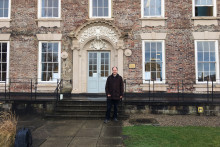There I am, sitting in the beautiful Great Hall of Castle, the oldest college of the University of Durham. History is written all over it. I attended there a lecture by Sir Nicholas Serota. Sir Nicholas has been the director of the famous Tate museum, actually a set of museums in London and other places in the UK. Currently he is Chair of the Arts Council England. In that capacity he is chairing the so-called ‘Durham Commission on Creativity in Education’ which aims to review the position of arts and creativity in high school education.
Is there a need to improve the position of the arts in the UK educational system? Apparently, as became clear during the talk, the role of arts in the education programs has declined strongly over the past ten years. This may have some similarities to changes in The Netherlands as well. Although, I am not so sure much has declined in The Netherlands on arts in high school; in my opinion there hasn’t been a lot, so there wasn’t a lot to decrease. But the appreciation and societal importance attributed to arts has been declining strongly, partly as a result of two decades of ‘liberal politics’ which has decided that the arts sector had to be subjected to the laws of economy instead of upholding the non-economic values connected to arts. But we’ll get back to that later.
Creative thinking
The prime focus of the talk, and the commission, is to stimulate creativity (not necessarily arts) in education. There can be nothing wrong with that aim, you would say. And indeed, most of us would find that learning a lot of facts and knowledge, without addressing that knowledge at a level where you can learn to ‘play’ with it, is outdated. Instead, we need ways of education that promote creative thinking, more than just knowledge, which may get outdated soon in our rapidly developing society anyway.
Now what is the plan of the commission to promote creativity in high school education? Well, that’s where I got lost! The main idea presented in the talk was to bring (back) more arts subjects in high school education, and then, miraculously, creativity would follow! But that would mean that creativity and arts are practically synonymous?! And that the arts has a monopoly on the transfer of creativity?! Is that so?
Obviously not! Claiming that arts is the one and only subject that can educate creativity is nonsense. Creativity is, obviously, important for all subjects taught in high school (whether the high school curriculum offers creativity, is a different question, though). Not only in arts, but for example also in languages: learning about literature and poetry, or better, learning to ‘play’ with literature and poetry by trying to write yourself, next to all the technical aspects needed to master grammar and structure, can give a whole new dimension and appreciation of a language. And most of you, active at a university of technology, know that creativity is important in all natural science subjects too! As a chemist, for example, I see that creativity plays an enormous role in designing new molecules, as well as the pathways of how to make them and let them interact. And you can phrase your own example for your own discipline.
I am convinced, therefore, that the way the commission aims to achieve its goal (If its goal is really to promote creativity!? Maybe its goal is really the promotion of arts?) is doomed to fail. Worse, the strong connection made between arts and creativity may indeed be viewed externally as some cheap trick to reinforce the arts in the school system without saying so. That way, this strategy could backfire and lead to even less arts in high schools.
Young violinist
Education requires both skills and competences on the one hand and creativity on the other hand to achieve true mastering of any subject, whether that is arts, language or science. Just facts and knowledge are insufficient, as people will not learn to apply all concepts and knowledge they have picked up. On the other hand, one cannot become truly creative without mastering the skills of the profession at the same time. To give an example from the arts, you need to spend (many) hours in practicing a musical instrument before you can successfully (creatively) play (or write) a Beethoven concerto. It is not surprising that when Paul Witteman asked a young violinist, in his famous Sunday evening television show on classical music recently, how she was able to play so beautifully at such a young age, she responded: ‘I practice a lot’…
So, can and should we change our high school education to favor more creativity? I say yes. Practicing creative exercises with deepening a subject need to go hand in hand. My perception is that at high school the two are mostly disconnected, and there is a too strong emphasis on facts and skills. Will we achieve more creativity across all disciplines by offering more arts subjects in the high school curriculum? I doubt it…
But, should we not just (or also) promote more arts in high school then? That is a different question, and the answer is: maybe. Arts has been neglected, and the lack of appreciation for arts is seen, in The Netherlands, in the decreasing position of artists, the decline of audiences at concerts, the decimation of amateur and professional music groups, etc. It is too easy to blame our busy schedules or the change of society for it (or even politics). I see here in the UK (and in Germany for that matter) that it can be different: Durham University students are very active in arts (and forgive my personal bias for music): there are two large symphony orchestras here, one wind orchestra, several choirs, numerous smaller singing groups, a thriving chamber music society, etc, and all that at a university that is hardly larger than ours.
Rescuing the Netherlands
How then can we reverse this trend? We have to recognize what arts is for: an enrichment of our lives, and a way to provide fulfillment to all who wish to get actively involved, amateurs and professionals alike. If we accept that, then it is easy to see that economy is not the right measure, and that promotion is needed, possibly at high schools, and that this has to lead to an increased societal appreciation of arts in general. In my view, we need to start (and why not at the UT?) with placing arts at the same level as sports: activities that deserve to be promoted, and that get the same appreciation and support. Only then we can start rescuing The Netherlands from turning into cultural wasteland…







